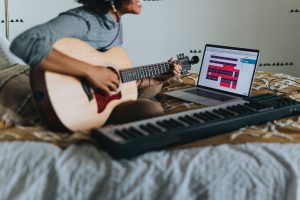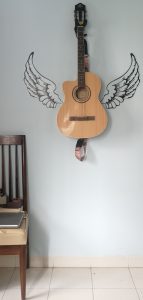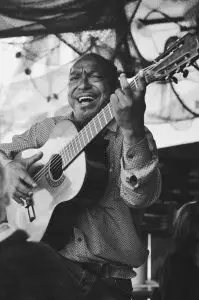There are many aspects to learning guitar, and if you are dedicated and know what you want to play, you can learn quickly.

In this article, we’re going to help you understand each of these aspects, and then, we’re going to show you what it takes to learn to play guitar in 2022.
Click on a bullet point to jump to any of the sections:
- Two Essential Things To Learn
- Hours of Practice
- Self Taught vs. Guitar Teacher
- Best Age To Learn
- Musical Background
- Best Guitar For Learning
So let’s get started!
Honestly, It’s not that hard if you take it one step (or one song) at a time!
You can make good music with only a few months of practice, and the process should be fun and stimulating. Try not to compare yourself with any other players who have dedicated their lives to practicing guitar, since that can feel discouraging.
Each has a unique personality and character. Learning guitar is more about the music and the message you want to deliver to others than winning a contest.
Learn to play guitar fast by starting with these two essentials…
From my experience, playing the guitar on a fundamental level can be summarized in two essential items:
- Strumming patterns
- The infamous CAGED system
Those are the techniques and skills I strongly recommend you to learn first!
(And obviously, learning your favorite songs any way you can.)
Here’s why…
The strumming patterns define the production of the sound on a physical level. 
There are tons of strumming patterns, but you just need to master three or four to play any song at a basic (and sometimes medium) level.
Whether you use pick or fingers, this aspect is essential.
Now let’s dive into the CAGED system…
The CAGED system stands for C, A, G, E, and D chords, representing a fretboard map.
Mastering these five simple chords in their major and minor variants can give you access to all the possible major and minor chords and allow you to play most songs, especially in the rock and pop genres.
It will take three and five months to learn these principles if you practice them daily. Other concepts like soloing, improvising, and special techniques can take years to develop. Still, if you master the CAGED system and the strumming patterns, you can make some great music at the beginning of your learning process.
Hours of Practice
Another aspect is the number of hours you are willing to invest.
This depends entirely on our particular schedule; work, time for sleep, time with family and friends, and many other individual factors.
And dare we say it… your ability to focus and practice with diligence and persistence!
We must say though, learning guitar is not a matter of just the amount of hours you put into it, but the quality of those hours.
Be strategic with your learning plan by having a focus to start out with. At this stage, you don’t need to master all aspects of guitar playing.
If you want to play blues, just learn and play blues stuff. If you want to play rock, don’t worry about trying to learn country chickin pickin.
Although some tricks are cool to learn from various styles, straying from your focus could delay your progress overall.
 How many hours of practice do I really need?
How many hours of practice do I really need?
There are those that practice eight hours a day (even more), and there are those who will tell you that they practice 15 minutes every day (or even less!).
When you’re a professional guitar player, the answer is not always straightforward.
Generally, you have shows, recordings, and other commitments, so the hours of “practice” don’t mean “hours of playing.”
Basically for professional musicians, you do whatever it takes to be ready for your gig.
However, being in the first stages of the learning process, I can tell you that any given amount of practice will work for you if it stays consistent and done with focus.
We strongly recommend you do at least one hour daily (it doesn’t have to be one hour straight; you can do half an hour in the morning and half an hour in the evening) and be very focused on the practice without any distractions.
Maybe you have skills focused practice in the morning (scales, strumming, CAGED), then you practice a new song in the evening. Or maybe you get a new effects pedal and just spend 30 minutes playing with it purely FOR THE JOY OF IT!!
Yeah, that counts as practice in our book. Always 🙂
Also, in order to learn fast, you need to put effort into things that feel hard for you. If you only practice things that are easy for you, your progress will quickly plateau and become a thing of boredom.
Instead of repeating things you’ve already mastered with ease, learning fast requires you to keep pushing yourself to learn new skills.
Also, it helps tremendously to try and master the basic and simples concepts before jumping into the most complex ones; the learning process requires you to accumulate previous skills to obtain new ones.
Be aware that the results don’t usually happen overnight, and have faith that growth will happen with a consistent effort on your learning process!
Self-taught vs. Teacher
Learning any discipline is possible through the use of the internet.
YouTube guitar teachers, we love you. Forever and always.
OK.
Nonetheless, having a personal teacher has advantages.
A teacher can save you a lot of time by helping you troubleshoot and resolve problems that you’re struggling with.
Maybe that fingering that you’ve been trying in the last three months is not the most efficient, and a teacher can propose you a new one that will work in two days of practice.
Or maybe you’ve searched for days through endless articles, posts, Youtube videos, and books, searching for the perfect content plan for learning the guitar, and your teacher can provide exactly that in two minutes.
Research can be an essential aspect of the learning process. However, this can represent a double-edged sword because being overexposed to a vast amount of information can be overwhelming and sometimes divert us from our goals.
Trying to know too much at once, especially in the early stages of your learning process, will slow you down and make you lose interest by thinking that learning guitar is hard (which it isn’t, trust me).
Don’t get me wrong, it’s possible to learn how to be good at guitar in a self-taught way, but it usually comes with the price of time. So if you have a personal teacher, it is possible to reduce it.
What Age Is Too Early or Too Late To Learn Guitar 
I encourage you not to consider this aspect since everyone can learn to be a great guitar player at any age.
It really is true!
Usually, as teachers, we see more advances in younger students, but this is because they have more time for practice.
Being an adult means having responsibilities with our work and with our family.
So people with specific age tend to have less progress and even tend to give up more quickly, but it’s not a matter of their age, but of the time they’re putting into the learning and the expectations they want to achieve.
Musical Background
If you have some music formation or know how to play another instrument, it can totally benefit you.
That doesn’t mean you need to read music or play another instrument to learn how to play guitar, but it can save you some time knowing the basics of music reading, chords, intervals, scales, and other concepts.
Also, knowing this stuff can give you access to more literature, sheets, tabs, and other resources that can accelerate your learning process.
Generally, playing any other instrument will give you some of this knowledge.
Suppose the instrument is a string instrument similar to the guitar (like bass, ukelele, mandolín, or banjo). In that case, you already have some ground covered in terms of the technique of both hands.
Many people think they need to learn the piano first, but this is not true, although playing it is a fantastic resource for any musician.
The Best Guitar For Learning
Unless your guitar is severely damaged or miscalibrated, the instrument you already have, or can get the soonest, is perfect for learning.
If you’re planning to buy a guitar, I recommend you buy the best guitar you can within the budget you can spend.
On the lower end of guitars, Seagull, Fender, Epiphone, G&L, Yamaha all make great acoustic and electric guitars for the price to get you started.
These days, the technology and the manufacture of the guitars are great, and you can find a very well-crafted guitar for a few hundred dollars or less if you go to OfferUp or Craigslist.
But I must warn you: if you get good at playing and begin to get more serious about it, your appetite for gathering up more and more equipment can grow voraciously! And it’s an inseparable part of the joy of playing guitar.
Also, we recommend to keep it well maintained because it will make playing so much more enjoyable and easy. Buy new strings often and keep changing them once every three months or a hundred hours of practice.
A good tuner and capo are also essentials you’ll want to get right away.
Many starting players ask what guitar is better for learning, acoustic or electric, and the truth is that you can learn to play in any of them and master both instruments.
One thing to consider is that the electric guitar needs an amplifier to produce sound at a hearable level, so you want to make room (and extra money) if you want to learn to play an electric guitar. This is not the case with the acoustic, which can sound naturally from its body.
The techniques of both instruments can differ slightly in terms of the picking hand. In that regard, you’ll have to choose if you want to learn the picking technique or fingerstyle (or even classical technique).
Once you learn one technique, you can quickly learn the other and be very good at both.
Conclusion
In most cases, you can start to understand and apply the basic principles and make a huge amount of progress in three to six months.
That means if you start at the beginning of summer, by the end of summer you can be a much better player with consistent practice and effort!
After this initial period, you can begin diving into the art of improvisation, soloing, developing speed, and special techniques.
Between one and two years, you can reach a level where you’re ready to start performing comfortably in front of a live audience.
The process of learning guitar never stops, although, in a few months, you can reach a pretty decent level of playing.
However, like any other discipline, you can dedicate your life to discovering and mastering its secrets all enjoying the process of learning the best instrument in the world.



Your words of encouragement to learn guitar regardless of age really creates a safe space community for all the guitar lovers – how are you finding Adsense is helping build this community?
I’ve worked alongside plenty of sites that are implementing personalization technology to stay ahead of the game – what have you got in mind for your sites future?
Free for a call? – Liv